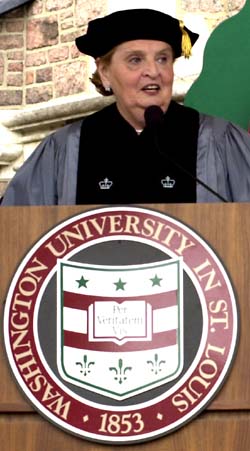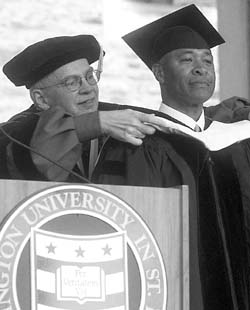The United States could suffer long-term consequences if it is not careful about how it uses its strength, Madeleine K. Albright said in delivering the Commencement address May 16.
“The extent of American power has created an opportunity for us to make our nation more secure within a world that is healthier, richer and more peaceful than it has ever been,” said Albright, who served as secretary of state during the Clinton administration.

“But if we are not prudent in exercising that power, we will create resentments that will make it much harder in the long run to achieve our goals.”
Albright and five others — Herman N. Eisen, Douglass C. North, Ozzie Smith, William P. Stiritz and Blanche M. Touhill — received honorary doctoral degrees at the University’s 142nd ceremony, attended by about 12,000 people.
“In our era, America is faced with a historic choice about the role it is to play in the world,” Albright said from Beaumont Pavilion in Brookings Quadrangle. “The strength of the United States is not in doubt. Our economy is the largest; our military the mightiest; our influence the most pervasive — not by a little, but by a lot.
“What is in doubt is how we intend to use our power.”
Albright said the Group of Eight summit of world leaders early this month in France represented an opportunity for President George W. Bush to clarify the character and purpose of American leadership.
“I hope the president will emphasize not only what our country is against in the world, but also what America is for: taking a hard line against terror, but also outlining plans to strengthen democracy, forge peace in the Middle East, help people around the world to live better lives, and transform the plague of HIV/AIDS from a menace into a memory,” Albright said.
“I hope he will put to rest suspicions about our intentions in Iraq, and (will put to rest) fears that we see ourselves as somehow above the international standards we apply to other countries,” she added.

Albright also said she hoped Bush will reaffirm America’s conviction that alliances such as NATO and the United Nations “are platforms for progress, not relics to be bypassed for fear they will hold us back or tie us down.”
“There are times when the United States, like any country, must act alone to defend its most vital interests,” she said. “But today, in most places, in most cases, America will stand taller and do better if we are part of a larger team.”
In congratulating the more than 2,500 graduates, Albright said she felt particularly privileged to participate in the ceremony on the eve of the University’s 150th anniversary.
“Few academic institutions are as much a part of their community as Washington University is in St. Louis,” she said. “This is reflected in the history you share, the community outreach you do, the facilities you make available and the values you teach. As a result, this University is a central part of the local scene.
“But it is also part of the global scene because of its reputation for high standards, its Nobel Prize-winning faculty, and the ethnic and cultural diversity of its student body.”